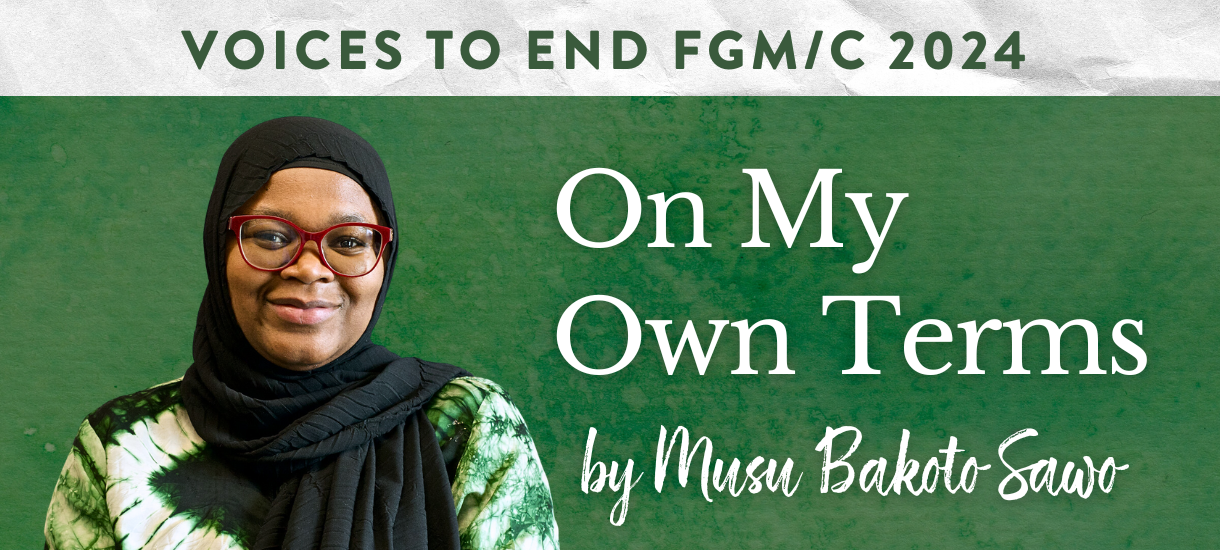Why did you want to attend the workshop and share your story?
I've had the opportunity to talk about my experience with female genital mutilation (FGM) and the ways in which it has impacted my life and my community. However, finding a platform that allows me to take ownership of my story—and have autonomy and control over the things that I share—is rare. So, when I heard about this opportunity, I thought it was amazing that there was a workshop where I could tell my story on my own terms.
What story did you choose to tell and create into a digital story?
My story was told in multiple parts. I talked about how FGM affects sexual intimacy; how it led me to become a child's rights activist; and how it has shaped my work as a human rights advocate. My story also reflects how I see FGM as something that does not define me because there are so many other wonderful aspects of my life. I don’t like being called a victim because I’m not—I am a survivor, that's how I define myself. I have gone on in life to achieve amazing things. I was part of the movement that led to the ban on FGM in The Gambia, and continue to be involved in protecting this ban. More recently, I have been involved in efforts to maintain the ban when it was threatened with repeal by Parliament. While this effort was successful, there is still more work to be done. We need to ensure the law remains in place to prevent a reoccurrence of the challenges we faced in the past several months. Additionally, we need to make sure that the law is fully implemented and enforced while continuously engaging with communities on the importance of sustaining the law.
What have you learned or most enjoyed during the workshop and by meeting others who shared their stories?
What I enjoyed the most about the workshop was the safe space created for us. This was particularly important to me because, although most of us were survivors of FGM, our experiences and stories were different. I was glad that we could all talk about our journeys on our own terms. I also appreciated the welcoming environment, which allowed everyone, including non-survivors, to share their voices. This openness, I believe, made it comfortable and safe for everyone to be vulnerable and share their thoughts and feelings. It’s like we created our own community as we held space for one another while bearing witness to each other’s stories as they were told. I also appreciated and valued the accommodations made to ensure that all participants had the best possible experience. It’s things like this that made the workshop a special and meaningful space to be a part of.
What kind of impact would you like your story to have?
I want people to start looking at survivors as people who have a voice—as people who have the right to share their stories and deserve to do so with dignity on their own terms. I also hope to inspire more people to get involved in the advocacy to end FGM. Through my story, I want people to understand the life-changing impact this practice has on women and girls. I want others to recognize the irreparable harm it causes in many different ways and understand why this practice must end.
Is there anything in your digital story that you would like to share?
I’d like to share this: if we don't take an intersectional approach in addressing FGM, we risk perpetuating even more problems and causing significant harm. For example, if the ban against FGM in The Gambia can be threatened, so can other laws prohibiting gender and sexual violance, such as the anti-child marriage law. We need to ensure that when we talk about FGM, we frame it within the broader context of all other forms of gender-based violence and oppression because, in many ways, they are all interconnected.
Musu Bakoto Sawo is a feminist human rights lawyer with over 18 years of experience in children’s and women's rights advocacy and activism. She holds a Master of Laws in Human Rights and Democratization in Africa and a Master of Global Affairs in International Peace Studies and Gender Studies. With over 10 years of leadership experience in program and policy development, advocacy, and fundraising, Musu has made significant contributions to non-profit organizations as well as public institutions in The Gambia and across the African continent.
Musu is also the recipient of numerous international and African human rights awards, including the 2018 Commonwealth Points of Light from Her Late Majesty Queen Elizabeth II; the 2020 Daily Trust African of the Year; and the Vera Chirwa Award from the Center for Human Rights at the University of Pretoria, South Africa. All these awards recognize her work for women and girls in The Gambia and beyond, particularly in relation to harmful traditional practices such as female genital mutilation (FGM). Her advocacy efforts contributed to the enactment of the legislation that banned both FGM and child marriage in The Gambia.

